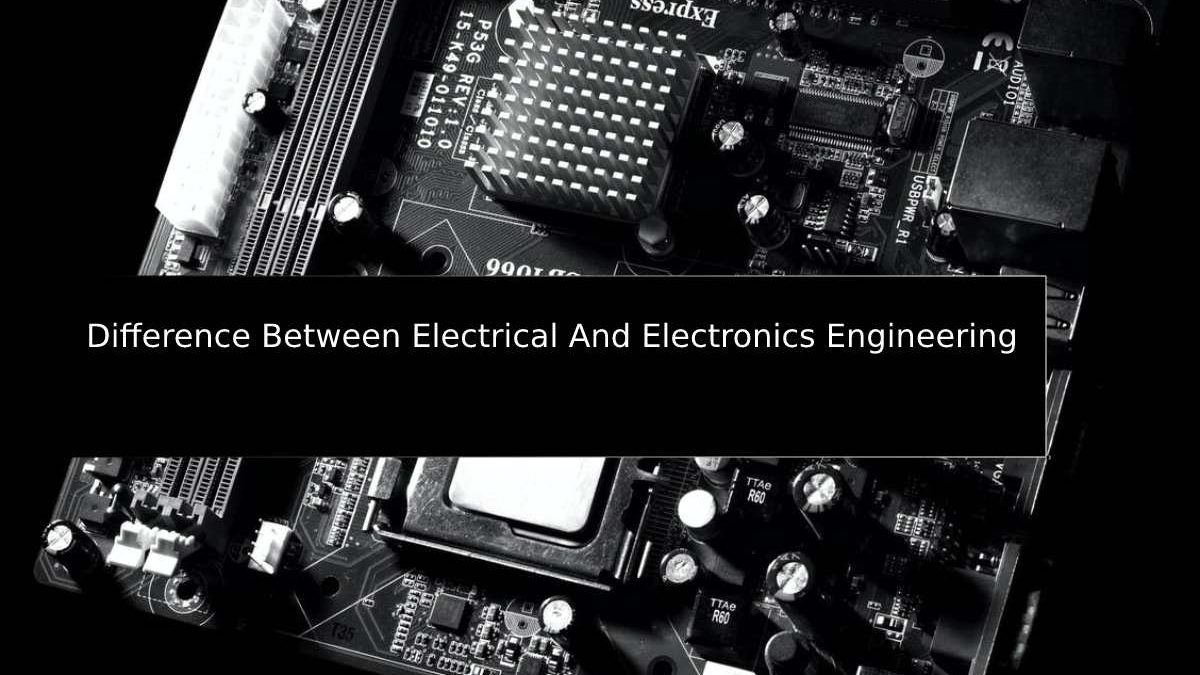Table of Contents
Introduction
Electrical And Electronics Engineering-After graduation, one of the first questions engineers ask is, “What do you want to do?” They usually have a few options to select from, and having a clear idea of what they want to do is a good place to start. However, it’s not that easy to decide what to specialize in when you’re just starting.
There are many different areas of engineering with different degrees that you can earn. One of the first specializes in electrical engineering and electronics.
Engineering has many subfields, and some of the most popular subfields are electrical engineering and electronics. Although the two domains share a similar name and get confused most of the time, the two are two different belongings.
The difference amongst Electrical and Electronics Engineering is significant as the field deals with different entities.
What Is An Electrical Engineering
Electrical engineering is the study of science concerned with how electrical energy can generate various electrical units and regulate their function. Electrical engineering is responsible for the study and design. The electrical discipline develops solutions to problems in many different fields, from telecommunications to space missions. Electrical engineering has many sub-areas. This area relates to the large-scale use of electrical energy.
Electrical engineers study various things such as systems modelling, power engineering and control, electromagnetism, operation of electrical machines, power conversion for motor and generator drives, electronic design, digital design, web-based computing, digital communication systems, and additional.
Few occupations in the world can get you out of bed, help you get through the day, and keep you up at night trying to figure out how to make things work. One of these professions is electrical engineering.
What Is Electrical Engineering?
What is electrical engineering? Difference between electrical engineering and electronics
Electrical engineering is the study of power and is one of the subfields of electrical engineering. Electrical Engineering deals with the principles and techniques of electrical engineerings, such as modelling, circuit analysis, manufacture and testing of electrical plans and systems. Also, this field helps in designing smaller electronic circuits like electronic devices and more.
Difference Between Electric Engineering And Electronic.
Electronics is a subfield of the broad Electrical Engineering category and this is the key difference between Electrical Engineering and Electronics.
For most people, the difference between electrical engineering and electronics is between a master and an apprentice. Electronics is the art of making and manipulating electronic devices such as televisions, computers, and mobile phones. On the other hand, electrical manufacturing is the science that deals with the study of electronic current and electromagnetism.
Difference Between Electrical And Electronics Engineering.
The term electrics deals with the flow of electrical energy or charge, while electronics deals with the flow of electrons. There is only a slight difference between electricity and electronics, and both deal more or less with electricity. If there is only electricity as energy, then one speaks of electricity. If a network manipulation of electrical energy occurs, one speaks of electronics.
What Is The Occupation Of Electrical And Electronics Engineers?
– An electrical engineer can be employed in various fields such as power generation, electronics, aerospace, construction, automotive, chemical defence, marine, telecom, consumer goods, pharmaceutical and more.
– An electrical engineer can take on different roles, e.g. B. Manufacturing Systems Engineer, Network Engineer, Controls and Instrumentation Engineer, Systems Designer, Broadcast Engineer, Systems Analyst and many more.
– Electronics engineers can work in electronics manufacturing companies, design companies, engineering firms, technology companies, and anywhere else to create electronic systems or devices.
– Electronics Engineers can work in positions such as Electronic Devices and Development Engineer, and Network Planning Engineer. Communication Engineer, CTO, Desk Support Engineer, Service Engineer and more
The average Indian salary for electrical engineering and electronics undergraduate students can be as high as 5 lakh per year. Therefore, there is not much difference in salary between electrical engineering and electronics, and both fields pay more or less equally. There is a much broader scope for these areas abroad. The global average salary range for these areas is $73,839 to $86,176 every year.
What To Choose, Electrical Engineering Or Electrical Engineering?
Electrical engineering deals with broader categories such as signal processing, communications, electronics, electromagnetism, and more. Electrical engineering is a micro-field that mostly deals with designing, processing, and optimizing electronic plans.
Now that you have an impression of the difference between electrical engineering and electronics, you will understand that electric is a wider field. If you’re sure you want to get into electronic design development, you might want to study electrical engineering.
If you want to study electrical energy and its processing in general, choose Electrical Engineering as the best option for you.
Conclude
“Electricity is the soul of the universe.” Electricity and electronic devices donate a lot to our daily lives. A comfortable and normal life without electricity is hardly imaginable. To keep the electrical fabric of life intact, we need engineers actively involved in electrical engineering and electronics. We hope that the previous blog cleared your doubts about the difference between electrical engineering and electronics. Are you excited to venture into this area? Let us know in the comments. Contact us if you have any questions.


